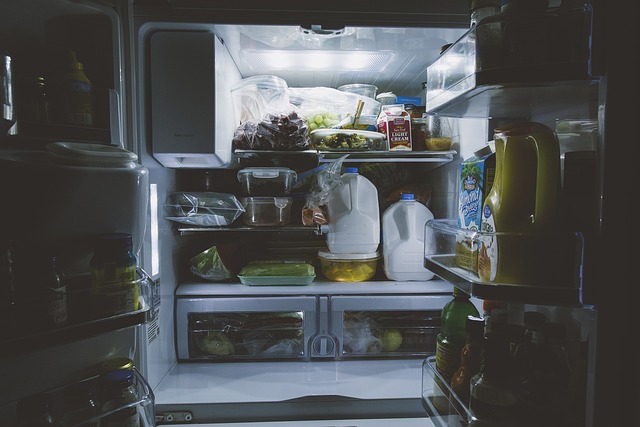If your refrigerator is making unusual sounds or leaking, it's time for some troubleshooting and potential repairs. Start by checking if the noise comes from the compressor, which might be overworking due to a poor door seal, allowing warm air in and causing excessive operation. For noise from the evaporator fan, inspect for looseness or obstruction that could be causing grinding or rattling. Cleaning the fan blades or tightening the fan motor usually resolves these issues. After a power outage, look into the starting relay or capacitor, as they're essential for the fridge's startup and may need professional handling due to electrical risks. Keeping condenser coils clean and ensuring good airflow can prevent noise and extend your refrigerator's life. If the noise persists after these steps, expert refrigerator repair services are your next move for a thorough inspection and necessary repairs.
For temperature issues that could lead to food spoilage or energy inefficiency, start with adjusting the thermostat settings and consider environmental factors affecting performance. Use an appliance thermometer to measure the internal temperature accurately for proper diagnosis. If the initial maintenance steps don't resolve the issue, refer to the repair manual or consult a professional for further troubleshooting or component replacements like the temperature sensor or control board, always taking safety precautions.
In terms of leaks, regular checks on door seals and the drain hole can prevent minor issues from escalating into significant water damage. If a leak occurs, identify the source—whether it's condensation, a clogged drain, or a faulty water supply line. Simple blockages might be cleared with cleaning, while compromised seals may need replacement. However, for complex leaks or when unsure of the cause, professional refrigerator repair services are recommended to ensure safe and efficient fridge operation. Regular maintenance and prompt action on these issues can help maintain your refrigerator's performance and longevity, which is essential for any kitchen.
When household appliances encounter issues, the refrigerator often takes center stage due to its critical role in food preservation. Common problems such as excessive noise, temperature regulation difficulties, and leaks can disrupt its operation and effectiveness. This article offers insightful guidance on identifying and resolving these issues through refrigerator repair techniques, ensuring your appliance runs smoothly and efficiently. Whether you’re facing an unexpected racket or struggling with maintaining the ideal temperature, or dealing with unwanted moisture, our comprehensive guide covers it all to keep your food fresh and your kitchen peaceful.
- Identifying and Resolving Excessive Noise in Your Refrigerator
- Troubleshooting and Fixing Refrigerator Temperature Regulation Issues
- Common Refrigerator Leaks and How to Prevent and Repair Them
Identifying and Resolving Excessive Noise in Your Refrigerator

When your refrigerator starts making unusual noises, it’s a clear sign that something may be amiss. Excessive noise can emanate from various components within the fridge, such as the compressor, fans, or even ice build-up in the freezer compartment. To pinpoint the source of the racket, listen carefully to where the sound is coming from. If it’s the compressor, it might be operating too frequently, which can indicate improper cooling, a refrigerator repair task often involves checking the door seals for any gaps or damage that could be allowing warm air to infiltrate, causing the compressor to overwork. Another common source of noise is the evaporator fan. If this component is loose or obstructed, it can create a grinding or rattling sound. Cleaning the fan blades or tightening the fan motor can usually resolve this issue. Additionally, if you notice an increase in refrigerator noise after a recent power outage, the starting relay or capacitor might be faulty and in need of replacement. In such cases, it’s advisable to consult professional refrigerator repair services to avoid electrical hazards. Regular maintenance, including cleaning the condenser coils and ensuring proper airflow, can help prevent excessive noise and extend the lifespan of your appliance. If self-diagnosis and troubleshooting fail to silence your fridge, it’s time to contact a specialist for an inspection and potential repair.
Troubleshooting and Fixing Refrigerator Temperature Regulation Issues

When your refrigerator’s temperature is off, it can compromise the freshness of your food and lead to inefficiency. To address this issue, begin with a visual inspection of your fridge’s thermostat, ensuring it’s set correctly. If the settings appear fine, consider the surrounding environment; excessive heat from nearby appliances or direct sunlight can affect temperature readings and performance. For a more in-depth analysis, use an appliance thermometer to confirm the actual internal temperature. This will help pinpoint whether the problem lies with the thermostat’s calibration or another component within the refrigerator’s temperature regulation system.
If the initial checks don’t resolve the issue, it may be time for a more technical approach. Check the refrigerator’s condenser coils, as these can become dusty over time, restricting airflow and impacting cooling efficiency. Clean the coils using a soft brush or vacuum cleaner with a crevice tool to remove accumulated debris. Additionally, inspect door seals for proper function; worn-out gaskets can allow warm air to enter, affecting the internal temperature. If the problem persists after these steps, it might be necessary to consult a professional or refer to your refrigerator’s repair manual for further troubleshooting or to replace parts such as the temperature sensor or control board. Always ensure safety precautions are taken when attempting any refrigerator repair to avoid electric shock or damage to the appliance.
Common Refrigerator Leaks and How to Prevent and Repair Them

When it comes to refrigerator problems, leaks can be one of the most common and inconvenient issues. To prevent such leaks, regular maintenance is key. Check the refrigerator’s seals regularly to ensure they are clean and intact. Damaged door seals can lead to cooled air escaping and condensation building up, which may result in water leakage. Additionally, inspect the drain hole located at the back of the refrigerator for clogs, as a blocked drain line can prevent proper water evacuation. If a leak occurs, prompt action is necessary to prevent water damage and ensure the fridge’s efficient operation. To repair a leak, first, identify the source: it could be condensation from the defrost system, a clogged drain, or a malfunctioning water supply line. For minor leaks, cleaning the drain hole or replacing a faulty sealer may suffice. If the issue is with the water supply line, it might need to be replaced entirely. In cases where the leak persists or if you’re unsure of the cause, professional refrigerator repair services should be consulted to avoid further complications and to ensure that the refrigerator is safe to operate. Regularly scheduled refrigerator repairs can prevent leaks from becoming a larger problem, saving you time and money in the long run.
When encountering common refrigerator issues, timely resolution is key to maintaining your appliance’s efficiency and longevity. Whether it’s excessive noise, temperature regulation problems, or leaks, understanding the underlying causes and implementing effective solutions can save you from potential food spoilage and costly repairs down the line. By utilizing the guidance provided in this article on refrigerator repair, homeowners can confidently tackle these issues themselves or know what to expect when seeking professional assistance. With these troubleshooting tips at hand, ensuring your refrigerator operates optimally becomes a straightforward task, safeguarding your investment and peace of mind in your kitchen.
